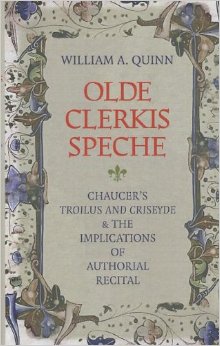
William A. Quinn, professor of English and director of the Medieval and Renaissance studies program in J. William Fulbright College of Arts and Sciences, has just published an innovative reading of Chaucer's Troilus and Criseyde. In his book, Olde Clerkis Speche, published by Catholic University Press in November 2013, Quinn affirms both the historical legitimacy and the interpretive benefits of reading Troilus and Criseyde as if the text were initially composed for Chaucer's own recital before a familiar audience. Proposing a qualification rather than contradiction of the "persona" as a reading premise, Quinn revitalizes the interpretive context of Chaucer's original performance milieu.
The central five chapters offer a "close hearing" of the possible tonal strategies of each book of Troilus and Criseyde during actual recital. Particular attention is given to expressions now normally overlooked, phrasing that does not advance the modern reader's appreciation of plot or character development or theme; such "filler" did, however, once offer Chaucer's own "reader response" (or ennaratio) during the recital event. These five chapters simultaneously evaluate the probability that Chaucer himself revised each recital installment for subsequent manuscript circulation. All together, these chapters provide a sustained case study of the interplay between the author's anticipations of recital presence and textual absence. Although this study does not pretend to detail an inaugural staging of Troilus and Criseyde, it does attend to the histrionic potential of Chaucer's own "speche/In poetrie" (T&C V.1854-5).
The final chapter of the book discusses how such a recital premise impacts several current controversies among Chaucerians, including the dating of Chaucer's individual acts of composition, the underlying assumptions regarding the "publication" of each text, the editorial imposition of punctuation on the manuscript record, and the poet's increasing anxiety regarding his future absence from the reading event. Olde Clerkis Speche will be of interest to all readers of Chaucer as well as everyone intrigued by performance theory and the history of reading
Quinn is the author of several essential books in the field of late medieval English literature as well as numerous articles in top journals. For more information on Medieval and Renaissance studies in Fulbright College, please consult the program's website.
Contacts
Lynda L. Coon, Professor
History/Religious Studies
479-575-5896,